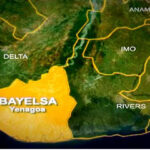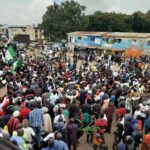As the partial internet glitch which hit Nigeria and some other countries along the West African coast persisted yesterday, many small and big business owners have continued to lament their inabilities to carry out optimal business transactions with their clients even as they count their financial losses.
Internet services were disrupted on Thursday morning across some West African countries, including Nigeria, due to undersea cable cuts experienced by some internet service providers.
Though the Nigerian Communications Commissions (NCC) Friday said repair works had commenced on the undersea cable cuts resulting in equipment faults on the major undersea cables along the West African Coast, the problem persisted yesterday.
Daily Trust reports that the incident yesterday continued to negatively impact data and fixed telecom services in several countries of West Africa, including Nigeria, Ghana, Senegal, Cote de Ivoire, among others.
Transport workers clash in Ogun over tickets
SSANU/NASU ground activities in varsities
In an update, one of the undersea cable companies affected by the service disruptions, MainOne, said the situation might persist for two to three weeks before the problem would be fixed.
Though NCC yesterday said 90 per cent services have been restored in Nigeria; the optimal business transactions have yet to be restored.
NCC Monday announced that services had been restored to approximately 90% of their peak utilisation capacities.
“All operators who were impacted by the cuts have taken recovery capacity from submarine cables which were not impacted by the cuts, and have thus recovered approximately 90% of their peak utilisation capacities,” the commission said in a statement signed by its spokesman, Reuben Mouka.
Mouka said Mobile Network Operators have assured the commission that data and voice services would operate optimally pending full repairs of the undersea cables as they have managed to activate alternative connectivities to bring back the situation to normalcy.
He said: “We extend our appreciation to telecom consumers for their patience and understanding during the downtime caused by the undersea fibre cuts.”
MainOne had explained that investigations revealed that the fault came from an external incident that resulted in a cut on the submarine cable system in the ocean.
It said the rectification of the fault, retrieving necessary spares required for repair, “sailing to the fault location for the repair work might take one to two weeks, while about two to three weeks of transit time may be required for the vessel to pick up the spares and travel from Europe to West Africa once the vessel is mobilized.”
Daily Trust gathered yesterday that telecommunications companies and a number of banks as well as other small and big owners which rely on the affected cables for internet services have continued to be affected by the outage and may have collectively lost billions of naira due to epileptic internet services.
A Lagos-based ICT startup owner, Engr Muyili Lasisi Oloba, told Daily Trust that his firm, Mujarad Hitech, could not operate fully since Friday and has recorded a huge financial loss.
Another Lagos-based business owner, Alhaja Bushra Oyetunde, said her furniture materials business slowed down in the last three days because her banks could not allow her to send or receive alerts.
Abdullahi Ooribielo, a business centre operator in Lagos, also said his business slowed because all that he does run on the internet.
MTN Nigeria was the most affected by the network disruption of all the telecom operators as it has the highest number of subscribers to its voice and data services.
The operator said in a statement that it was working with its partners like Bayobab to repair the damaged underwater digital communication cables along the West African sub-region.
It added that Bayobab was also working with partners to mitigate the impact of the damage by rerouting traffic and enabling more circuits. MTN claimed that it already made progress in restoring service in some affected regions and remained committed to achieving full recovery as expeditiously as possible.
The statement read in part, “As confirmed by their consortium partners, on March 14, 2024, four subsea cables were cut. They are WACS, ACE, SAT3 and MainOne.
“Bayobab is also working with partners to mitigate the impact of the damage by rerouting traffic and enabling more circuits. The ACE and WACS have jointly initiated the repair process by mobilising a cable ship for a collaborative repair effort. While investigation and repair efforts are underway, Bayobab’s strategy focuses on successfully rerouting traffic, leveraging our extensive network, and collaborating with industry partners.
“Our network resiliency allows for the swift activation of new cables, facilitating faster rerouting and bolstering network resilience. By activating new cables, we quickly increase interconnectivity and establish alternative routes.
“Additionally, we are working with the cable consortiums and partners to enhance interconnection along both the west and east coasts, with further interconnections between WACS and Equiano, and the introduction of the end-to-end connection between WACS on the west coast and EASSy on the east coast.”
However, Glo 1, owned by Nigeria’s leading digital services company, Globacom, was not affected by the damage and has continued to operate normally. Data users, internet service providers and financial institutions which run on Glo 1 have continued to operate normally.
Industry analysts believe the ‘sturdy’ nature and resilience of Glo 1 International Submarine Cable is the reason the damage did not affect the cable.
Meanwhile, WIOCC, Africa’s digital backbone, is leading the continent’s response to the cable cuts currently affecting the WACS, ACE, MainOne and SAT3 subsea systems on Africa’s western seaboard.
WIOCC’s highly resilient network, with hyperscale capacity on every major system is the largest in Africa and ideally placed to swiftly deliver restoration solutions to hyperscalers, fixed and mobile carriers, internet service providers and other clients, enabling them to quickly re-establish key traffic routes into, within and out of Africa, thereby minimising performance degradation for their end-customers.
Chris Wood, Group CEO of WIOCC, said, “Immediately the four subsea cables were severed off the coast of Cote d ‘Ivoire our engineering, operations and field teams swung into action. They have been working tirelessly for the last 48 hours with our strategic network partners and equipment suppliers and will, within the next 24 hours, have activated an unprecedented additional 2 Terabits per second (Tbps) of capacity across the unaffected cables in our network to support the capacity needs of other network operators and hyperscalers. Our clients connected directly at Open Access Data Centres (OADC) data centres in South Africa and Nigeria are already protected from the impact of the subsea outages due to the unique levels of redundancy and scale of the WIOCC core backbone. In Lagos, the Equiano cable, in which WIOCC owns a fibre pair, has not been affected by the incident off Cote d‘Ivoire. WIOCC lands the cable directly into the OADC data centre, establishing the most resilient digital ecosystem hub in Lagos and offering the most direct connectivity to Europe and South Africa. As a result, OADC’s data centres and WIOCC’s hyperscale network are playing a key role in restoring services to other facilities and operators currently suffering outages in Lagos and elsewhere on the continent.”
“Our priority is to ensure minimal disruption and maximum resilience for our clients,” added Ryan Sher, Group Chief Operating Officer at WIOCC.
“We have invested heavily in deploying diverse, highly-scalable national and international connectivity to support the uptime requirements of our wholesale client base. Investing at scale means that we consistently carry extra capacity, ensuring we are able to rapidly turn up or re-route capacity to address unexpected network disruptions. It also enables us to deploy short-term restoration solutions for other operators on a case-by-case basis. Any service provider affected by these outages, whether an existing WIOCC client or not, is encouraged to contact us to explore options,” he said.
He said WIOCC’s policy of strategic deployment of converged, open-access digital infrastructure at a hyperscale level and delivery of unrivalled resiliency, enables it to meet and anticipate the needs of Africa’s wholesale community with sufficient scale and network diversity to address even the most challenging situations.
But the Association of Telecoms Companies of Nigeria has said there is a need to locally domicile contents and put more investments in localised data centres to reduce the effect of disruptions in connectivity.
ATCON’s president, Mr Tony Emoekpere, told the News Agency of Nigeria that it was important to domicile contents locally as this would make for prompt fixing of outages and disruptions.
The ATCON president was reacting against the backdrop of the internet disruption that occurred on Thursday which had a major effect on banks and telcos in Nigeria and other African countries.
“Nothing can be done exactly to reduce the damage of submarine cables, but most importantly, there is a need to domicile more of our contents locally.
“Most locally domiciled contents were not affected because such contents were hosted in data centres localised in the country.
“There is a need for investment in more data centres in the country to reduce the effect of Internet disruption,” he said.
He added that Nigeria and South Africa were the least affected by the latest cuts because of more submarine cables coming into the countries.

 Join Daily Trust WhatsApp Community For Quick Access To News and Happenings Around You.
Join Daily Trust WhatsApp Community For Quick Access To News and Happenings Around You.


